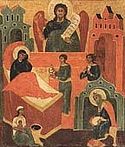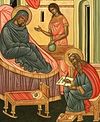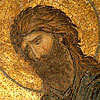

| Previous day | Next day |
| Old Style
May 25
|
Wednesday |
New Style
June 7
|
| First Week after Pentecost (Fast-free period). Tone 7. | No fast.
|
![]() Third Finding of the Precious Head of St. John the Baptist (ca. 850).
Third Finding of the Precious Head of St. John the Baptist (ca. 850).
Hieromartyr Therapontus, bishop of Cyprus (4th c.). St. Innocent (Borisov), archbishop of Kherson (1857). St. Thaddeus, archimandrite, of Svatogorsk Monastery (1758).
New Martyr Tavrion (Tolokontsev), monk, of Veliki Ustiug (1939).
St. Aldhelm, bishop of Sherborne (709). St. Bede the Venerable, hieromonk and chronicler, of Wearmouth and Jarrow (735). St. Gennadius, bishop of Astorga (ca. 936). Commemoration of the reunion of three million Uniates with the Orthodox Church at Vilnius in 1831. 1,290 New Martyrs of Piva (Montenegro), killed by the Nazis (1943).
Repose of Recluse George of Zadonsk (1836).
Thoughts for Each Day of the Year
According to the Daily Church Readings from the Word of God
By St. Theophan the Recluse

Wednesday. [Rom. 1:18–27; Matt. 5:20–26]
Except your righteousness shall exceed the righteousness of the scribes and Pharisees, ye shall in no case enter into the Kingdom of Heaven (Matt. 5:20). Characteristic of the scribes is knowledge of the law without concern for life according to the law. Characteristic of the Pharisees is correctness of outward behaviour without particular concern for correctness of thoughts and feelings in the heart. Both attitudes are condemned to remain outside of the heavenly kingdom. Let everyone receive from this the lesson he needs. If you want to learn the Gospel law, do so—but in a way that enables you to establish your life according to this knowledge. Try to be correct in your behaviour, but keep your inner feelings and dispositions correct at the same time. If you have gained some knowledge, do not stop there, but go further and understand the demands such knowledge makes of you—then act appropriately. Let your behaviour show that your feelings and dispositions are not the result of externals, but such that your external behaviour proceeds from your feelings and dispositions, and actually expresss them. If you gear yourself this way, you will be higher than the Scribes and Pharisees, and the doors of the kingdom will not be closed to you.
Articles
 Nativity of the Holy Glorious Prophet, Forerunner and Baptist, John |
 St. John the Baptist |
 Hieromartyr Therapon the Bishop of CyprusThe Hieromartyr Therapon, Bishop of Cyprus, lived a life of asceticism in a monastery, and afterwards he served as a bishop on the island of Cyprus. |
 Venerable Bede, the Church HistorianSaint Bede was a church historian who recorded the history of Christianity in England up to his own time. |













